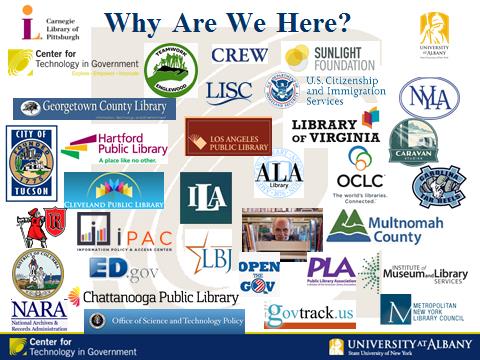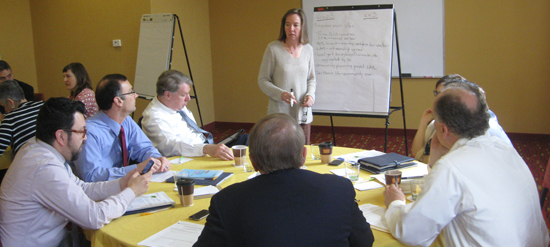CTG Releases Summary Report for Stakeholder Workshop on the Role of Public Libraries in Enabling Ope
CTG held The Role of Public Libraries in Enabling Open Government: A Stakeholder Workshop on May 7-8, 2014 in Alexandria, Virginia. The workshop brought together a national forum of approximately 40 thought-leaders from public libraries, academia, government, open government, and other organizations to explore the ways public libraries can enable open government within their communities.

The IMLS Workshop engaged a wide diversity of stakeholders.
This workshop is part of a larger initiative that CTG is leading with support from the Institute of Museum and Library Services (IMLS) through a 2013 Laura Bush 21st Century Librarian Program (LB21) grant. The overarching goal for this project grant is to develop a model or framework that will assist public libraries in better communicating the roles they currently play in opening government while also enabling public libraries to share best practices in this area.
The first objective of the workshop was to work with participants to conduct an expert review of the Enabling Open Government for All: A planning framework for public libraries concept paper developed by the CTG team and the project’s Advisory Committee. The second objective was to bring together a diverse group of stakeholders to discuss the topic of public libraries and open government with a goal of sharing knowledge of existing open government related public library activities, challenges, risks and value while also creating networks for future partnerships in research and projects.
These objectives were achieved through a series of interactive small and large group exercises as well as expert presentations on the topics of open government, the impact of digital government on public libraries, and an exemplar case of one public library’s activities to open government within its community. The small group exercises and moderated large group discussions provided participants the opportunity to share their thoughts and ideas towards the proposed framework and concept paper providing greater insight into the challenges, value and opportunities that exist for public libraries in the open government space. The CTG team collected the results of each of these activities using flip charts, notes, and a digital audio recorder.

Participants brainstorming ideas at the Critical Role of Public Libraries in Enabling Open Government Stakeholders workshop.
Participants discussed opportunities in several key areas:
- strengthening and creating new partnerships,
- improving basic civic and digital literacy,
- identifying community interests, and
- sharing information across organizations and among community actors,
Building capability in these areas is likely to improve accountability and trust within the community as well as develop citizens’ skills for being better information consumers.
Throughout the workshop, two key themes emerged that provided important insight into how public libraries can best proceed in the open government space. The first was the need for a definition of open government specific to public libraries. The second was recognition that while public libraries are already doing meaningful open government work, there is currently little attention to sharing those practices across the public library community.
Near the end of the workshop, participants were also asked to generate ideas for potential proof of concepts project that would help public libraries improve their capabilities to enable open government within their communities. In this exercise, participants were asked to think about the potential stakeholders involved in the activity or project along with benefits to those stakeholders and potential partners necessary for the project or activity to succeed. A full listing of the ideas generated are included in the summary report.
The CTG team will use the workshop results outlined in the summary report as input to a final project report. This report will include a revised version of the preliminary framework. In addition, the report will include ideas for future initiatives identified throughout the project and considered value-added by CTG and the Advisory Committee.